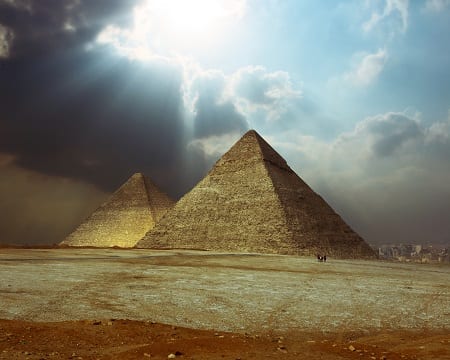 Our God can beat up your gods!
Our God can beat up your gods!
That’s a bold statement, right? Make it into, “Our God created your gods,” and it’s a little less schoolyard bully-ish, but it becomes even more bold. This is a serious claim.
You may not have seen it, but that bold statement is right there in the beginning of Genesis. Genesis is God’s word to the Hebrews through Moses, a people fleeing slavery and headed for the Promised Land. When Moses describes the creation of the world, he isn’t just telling a story about a bunch of things He made. If we can think like an Egyptian, we see the creation of light and dark, sun, moon, waters and the living creatures as a declaration of God’s lordship over the gods, over everything the Egyptians — and likely many of the Jewish slaves — worshiped.
Bible study
It’s very easy to read the Bible without spending any time thinking about the context, the audience, the author or the intent. You will even hear some people say Christians should not use study Bibles because the notes will get in the way of reading Scripture “cleanly.” It’s true if you are told ahead of time what every verse means, you may not ever be able to read Scripture as it is. That’s not good. At the same time, context makes a huge difference, and sometimes knowing context is the only way to have any idea what Scripture is really teaching. If we only read the Bible translated into a new language and as modern humans, we are guaranteed to miss out on the meaning even if we get all the words.
In Genesis, God does more than relate a sequence of events from the creation. To a bunch of freed Egyptian slaves, He proclaims his Lordship over everything they would have seen worshipped in their former home. God declares, “I am above all gods,” even as he says, “I created the heavens and the Earth.”
Context matters
Context matters everywhere. Did you know shepherds were considered the lowest of the low, death by hanging on a tree (including one formed into a cross) was considered a humiliating and even accursed death, riding a donkey was symbolic of being a conquering king, and much of the Pentateuch (the beginning of the Old Testament) is written in the form of a treaty between a king and his vassals?
You don’t have to know about dirty shepherds or humiliating trees to appreciate Christ’s sacrifice for your sins. But when you do know it, it makes it that much more amazing that the God of the universe took on human form, spent time with the truly lowest of society and died not just horribly but shamefully.
Learn the backstory
If you want to open up the Bible a little more next time you read it, get a study Bible or a companion to the Bible that provides the historical backstory, a few words about the audience and information about the author. You may find God throwing Ra off his pedestal, where before you only saw the sun being born. You don’t have to think like an Egyptian to read Genesis, but when you do, you’ll find truth you never saw before. And when you get more out of the Bible by learning its context, you’ll have more from the Bible to apply to your own context.
Dr. Tim Sansbury is vice president of administration and a lecturer of theology and philosophy at Knox Theological Seminary. He can be reached at [email protected].

Comments